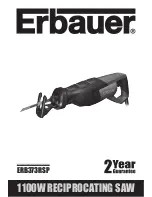
Everyday eyeglasses have only impact-resistant lenses; they are NOT safety
glasses.
Following this rule will reduce the risk of serious personal injury.
5. Always wear hearing protection during extended periods of operation.
Following
this rule will reduce the risk of serious personal injury.
6. Keep your hands away from cutting area.
Do not reach under the material being cut
because the nearness of the blade to your hand is hidden from your sight.
7. Do not use dull or damaged blades.
Bent blades can break easily, or cause kickback.
8. Remove the plug from the socket before carrying out any adjustment, servicing or
maintenance.
9. Fully unwind cable drum extensions to avoid potential overheating.
10. When an extension cable is required you must ensure it has the correct ampere rating for
your power tool and is in a safe electrical condition.
11. Ensure your mains supply voltage is the same as indicated on the rating plate.
12. Your tool is double insulated for additional protection against a possible electrical insulation
failure within the tool.
13. Always check walls, floors and ceilings to avoid hidden power cables and pipes.
14. After long working period, external metal parts and accessories could be hot.
15. Only withdraw the blade from the cut when the blade has been stopped moving.
16. The pivoting blade foot must be held firmly against the material being cut to reduce saw
vibration, blade jumping and blade breakage.
17. Before cutting, check the cutting line is free of nails, screws, etc.
18. If possible, ensure the work-piece is firmly clamped to prevent movement.
19. Never stop the cutting blade by applying side pressure to the blade.
Warning: Some dust particles created by power sanding, sawing, grinding, drill
and other construction jobs contain chemicals known to cause cancer, birth
defects or other reproductive harm.
Some examples of these chemicals are:
• Lead from lead-based paints.
• Crystalline silica from bricks and cement and other masonry products.
• Arsenic and chromium from chemically treated timber.
Your risk from these exposures varies, depending upon how often you do this type of work. To
reduce your exposure to these chemicals:
• Work in a well-ventilated area.
• Work with approved safety equipment, such as those dust masks that are specially designed
to filter microscopic particles.
Summary of Contents for ERB373RSP
Page 1: ...1100W RECIPROCATING SAW ERB373RSP...
Page 2: ...Original Instructions Version 1 0...
Page 18: ......
Page 19: ......
Page 20: ......






































